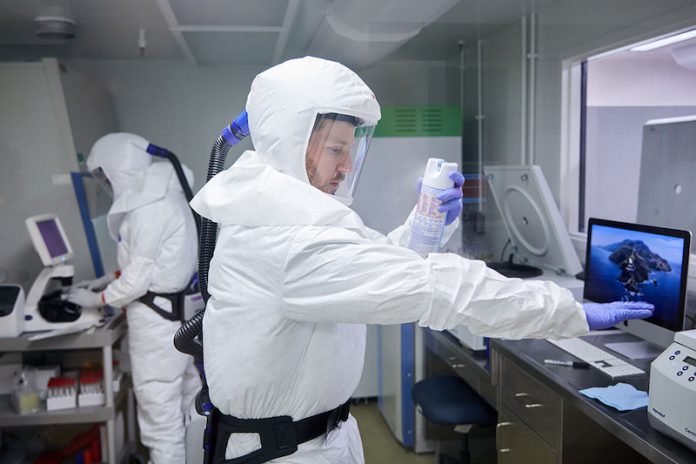
The global effort to quickly develop drugs and vaccines for COVID-19 has been hampered by limited numbers of laboratory mice that are susceptible to infection with SARS-CoV-2, the virus that causes COVID-19.
In a new study, researchers have developed a mouse model of COVID-19 that replicates the illness in people.
Further, the same approach could be adopted easily by other scientists to dramatically accelerate the testing of experimental COVID-19 treatments and preventives.
In addition to drug and vaccine testing, scientists can use the model with mice bred to develop health conditions such as obesity, diabetes, or chronic lung disease to investigate why some people develop life-threatening cases of COVID-19 while others recover on their own.
The research was conducted by a team at Washington University School of Medicine in St. Louis.
There’s been a huge push to develop vaccines and therapeutics as quickly as possible, and since animal models have been limited, these investigational drugs and vaccines have been put directly into humans, and many of them haven’t panned out.
Mice are useful because researchers can study a large number of them and observe the course of the disease and the immune response in a way that is hard to do in people.
It would be more cost-effective and efficient and safer for people if scientists could get more information about how these potential drugs and vaccines work and how effective they are before they move to more challenging non-human primates and ultimately human studies.
Mice do not naturally get infected with the virus that causes COVID-19.
To infect people, the virus latches onto a protein called angiotensin-converting enzyme-2 (ACE2) on the surface of cells in the respiratory tract.
But the human ACE2 protein is different from the mouse ACE2 protein, and the virus is unable to attach to the mouse version.
The virus that caused the SARS epidemic in 2003 is closely related to the one causing the COVID-19 pandemic, and the SARS virus also infects cells by latching onto the human ACE2 protein.
During the SARS epidemic, researchers created a strain of genetically modified mice with the human ACE2 protein so they could study SARS.
After the epidemic ended, however, interest in SARS waned and the mouse colonies were closed.
The emergence of COVID-19 earlier this year triggered a frantic rush to begin breeding the mice again, but even now there are not nearly enough mice for all of the researchers who want to study the disease and to test potential vaccines and therapeutics.
The team previously had made an effort to develop a mouse model of Zika infection, and they realized they needed a faster way to obtain mice that could be used for COVID-19 studies.
In the study, the team inserted the gene for human ACE2 into a mild respiratory virus known as an adenovirus. They also infected mice with the modified adenovirus.
The animals produced human ACE2 in their respiratory tracts for a few days, making them vulnerable to infection with the virus that causes COVID-19.
To see whether mice develop an illness similar to the one in people, the researchers infected mice with the modified adenovirus, and then five days later gave them the COVID-19 virus through the nose.
The virus quickly spread along the respiratory tract and especially to the lungs, where it replicated to high numbers and caused pneumonia with marked inflammation, much as it does in people.
The researchers also found lower levels of virus in the heart, spleen, and brain—all organs that can be targets of the virus in people. The mice lost 10% to 25% of their body weight during their illnesses but ultimately recovered.
The team says scientists can use the mouse model to test vaccines or drugs, study the immune response, and many other things related to how the virus causes disease.
The model also can be used to better understand the factors that put some people at risk of severe COVID-19 disease.
Advanced age, male sex, and conditions such as obesity, diabetes, and heart, kidney, or lung disease all increase risk of severe COVID-19 for reasons that are not fully understood.
One author of the study is Michael S. Diamond, MD, Ph.D., the Herbert S. Gasser Professor of Medicine, and an expert on viral infections.
The study is published in Cell.
Copyright © 2020 Knowridge Science Report. All rights reserved.



